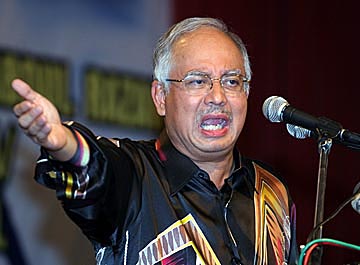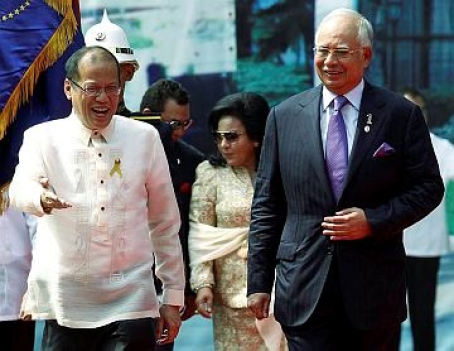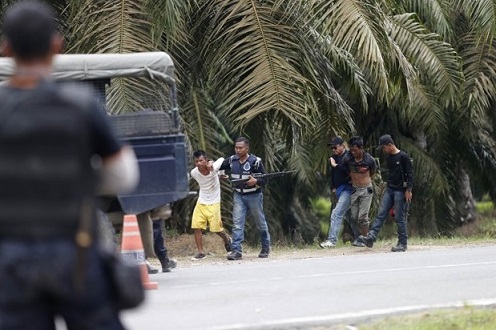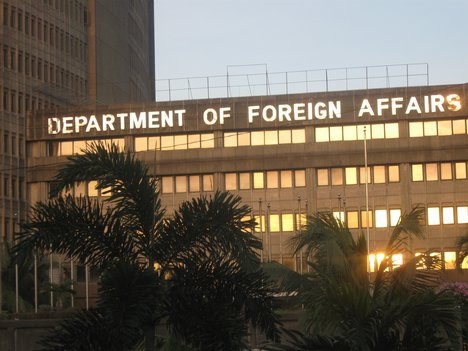By Ellen Tordesillas, VERA Files

Malaysian Prime Minister Najib Razak. Photo from kualalumpurpost.net
Concerned citizens are hauling the Malaysian government to the United Nations for human rights abuses against Filipinos in Sabah, even as they criticized the Philippine government for lack of outrage and action.
Concerned groups and individuals are filing Monday urgent appeals with the UN High Commissioner for Human Rights Navanethem Pillay and UN High Commissioner for Refugees António Guterres, both based in Geneva, Switzerland.
In their letters, the civil society groups asked the two UN agencies to “urgently intervene so that Malaysia will respect the human rights of the Filipinos in Sabah, recognized under the Universal Declaration of Human Rights.”
The signatories include civil society groups led by the Concerned Citizens Movement, CenterLaw, Bagong Alyansang Makabayan, and Anakbayan.
Among the individual signatories are human rights lawyer Harry Roque, activist nun Sr. Mary John Mananzan, whistleblower Rodolfo “Jun” Lozada, journalist Vergel Santos, and political strategist Pastor Saycon, who serves as adviser to Jamalul Kiram III, one of the heirs of the Sultan of Sulu.
They also asked the two UN bodies “to express grave concern on the massive and gross human rights violations by Malaysia against Filipinos in Sabah” and to remind Malaysia to “provide effective remedies and compensation to the Filipino victims of the massive and gross human rights violations committed against them by Malaysian state agents.”
In the two 11-page petitions, the signatories detailed the maltreatment of Filipinos in Sabah starting Feb. 14, 2013, when “suspected Filipino gunmen numbering between 80 to 100 were cornered in the Malaysian state of Sabah on Borneo Island triggering the start of the Sabah standoff.”
They quoted from published media reports on the abuses committed by Malaysian authorities, citing, in particular, the Philippine Daily Inquirer account of the Filipina named Amira Taradji, who arrived from Sabah in Patikul, Sulu, with about 200 other refugees on March 8.
Taradji said she and her family had to flee from Lahad Datu because Malaysian police raided their homes and arrested men. Those who evaded arrest waving their immigration papers were reportedly killed.
“If you are lucky to reach the jail, you will die of starvation because they will not feed you,” Taradji was quoted as saying.
The petitions also quoted Mayor Hussin Amin of Jolo, Sulu retelling the stories of the survivors. “Our people are treated like animals there,” he said.
The signatories cited specific violations of the Universal Declaration on Human Rights (UDHR) committed by Malaysian state agents, among them the right against discrimination under Articles 2 and 7; the right to life, liberty and security of person under Article 3; the right not to be subjected to torture or to cruel, inhuman or degrading treatment or punishment under Article 5; right against arbitrary arrest, detention or exile under Article 9; and right to a fair trial under Article 10.
The trouble stems from the 51-year-old ownership dispute between the Philippines and Malaysia over Sabah, which covers an estimated 28,400 square miles rich in oil and timber, about 20 kilometers away from Tawi-Tawi in Southern Mindanao. Sabah comprises 20 per cent of Malaysian territory.
Government figures put the number of Filipinos in Sabah at 800,000 although non-government workers in the area the figure could be as high as 1.4 million.
Sabah (North Borneo) originally belonged to the Sultan of Brunei, who then gave it to Sultan of Sulu Salah ud-Din Karamat Bakhtiar in 1658 as a reward for helping quell a rebellion.
In 1878, Sulu Sultan Jamalul Alam Kiram leased North Borneo to the Hong Kong-based British North Borneo Company of Baron Gustavos von Overbeck and Alfred Dent for 5,000 Malaysian dollars a year.
In 1946, Overbeck and Dent, without permission from the Sultan, transferred the territory to the British government when the company ceased operations.
On Sept. 11, 1962, Sultan of Sulu Mohammad Esmail Kiram ceded to the Philippine government full sovereignty, title and dominion over the territory. President Diosdado Macapagal filed the Philippines’ claim over Sabah with the United Kingdom.
In 1963, the British government, again without permission from the Sultan of Sulu, transferred Sabah to the newly formed Federation of Malaysia.
Last Feb. 12, 2013, some 200 men claiming to be the Royal Sulu Sultanate Army led Raja Muda Agbimuddin Kiram, younger brother of the self-proclaimed current Sultan of Sulu, Jamalul Kiram III, landed in Lahad Datu village in the northeastern part of Sabah.
The group said they were asserting their right to the land as they denounced the maltreatment of Filipinos by Malaysia.
Some 60 persons have been reported to have died in almost two months of hostilities.
President Aquino has called the action of Kiram’s men “foolhardy” and said their objective was “a hopeless cause.”
Even as the Department of Foreign Affairs expressed “grave concern” over the maltreatment of Filipinos by Malaysian authorities, Aquino never even condemned the abuses. Diplomatic sources said Aquino was even irked by the DFA statement.
In many of his speeches during the standoff, Aquino sided with Malaysian Prime Minister Najib Razak’s hardline policy on Kiram’s men and praised Malaysia for its role as broker in the peace talks with the Moro Islamic Liberation Front.
Last March 6, UN Secretary-General Ban Ki-moon expressed concern over the situation in Sabah and urged all parties to stop the violence and start dialogue for a peaceful resolution.
He urged all parties “to facilitate delivery of humanitarian assistance and act in full respect of international human rights norms and standards.”
In response to the UN call, Kiram III ordered his forces in Lahad Datu to enforce a unilateral ceasefire. Malaysia rejected the call while Malacañang did not respond.
(VERA Files is put out by veteran journalists taking a deeper look at current issues. Vera is Latin for “true.”)



